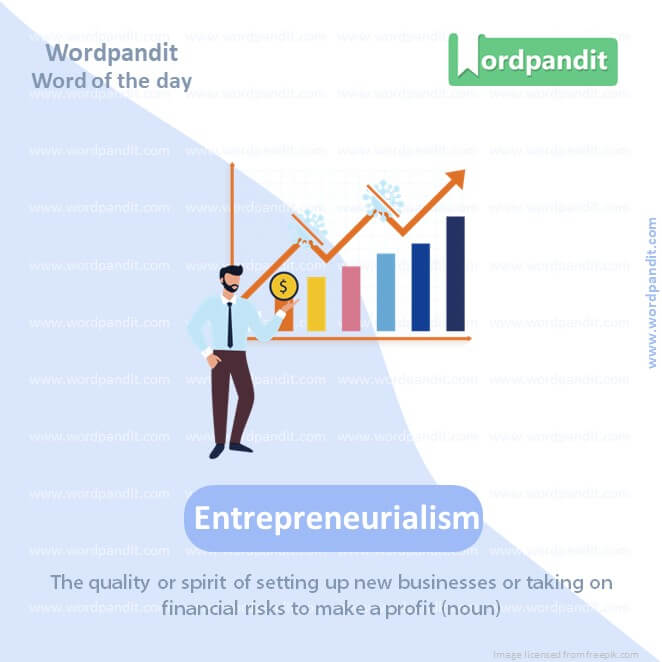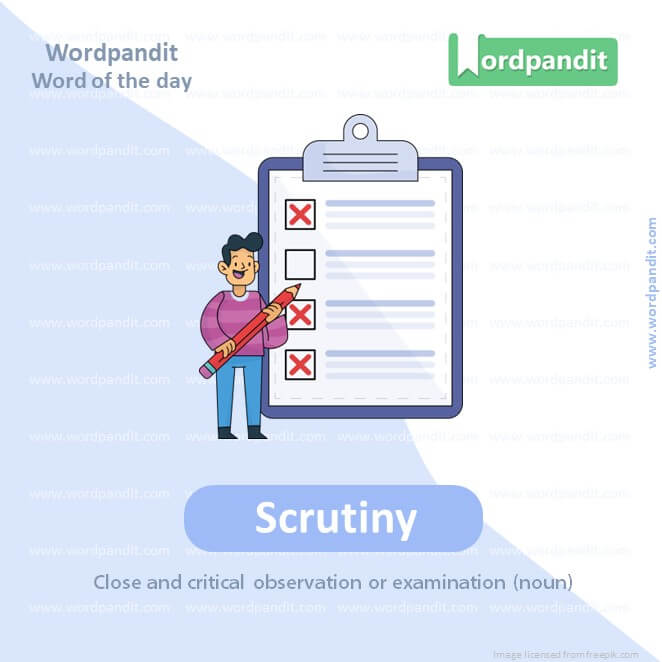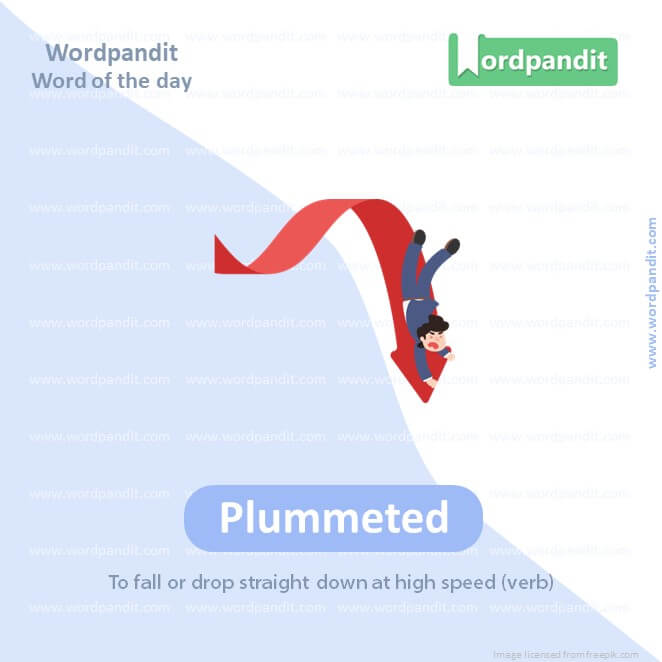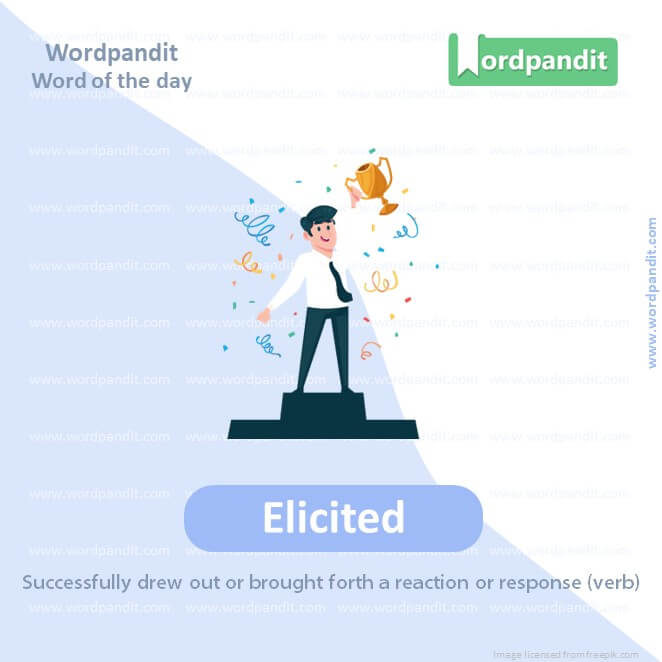Daily Vocabulary Words: List of Daily Used Words
Hi there. Welcome to this special section @ Wordpandit.
Our endeavour here is straightforward: highlighting important daily vocabulary words, you would encounter in The Hindu. This is your repository of commonly used words; essentially, we are posting a list of daily used words. Hence, this has significant practical application as it teaches you words that are commonly used in a leading publication such as The Hindu.
Visit the website daily to learn words from The Hindu.

WORD-1: Entrepreneurial
CONTEXT: the Energy Transitions Innovation Challenge (ENTICE) provide a forum for individuals, especially women, to embark on entrepreneurial ventures and drive collective action for sustainable energy practices.
SOURCE: The Hindu
EXPLANATORY PARAGRAPH: Imagine you have a lemonade stand where you sell drinks to your friends. You’re the boss, making all the decisions like what price to sell your lemonade and how to make it taste the best. Being entrepreneurial means you’re really good at coming up with ideas like your lemonade stand and making them real, just like a captain steering a ship on a big adventure.
MEANING: The quality or spirit of setting up new businesses or taking on financial risks to make a profit (noun).
PRONUNCIATION: en-tre-pre-neur-i-al
SYNONYMS: Innovative, inventive, enterprising, visionary, creative, ambitious, pioneering.
USAGE EXAMPLE:
1. She has an entrepreneurial spirit that reminds me of a young inventor.
2. The entrepreneurial challenge was to open a bookstore that also served as a café.
3. His entrepreneurial success story was featured in a magazine.
4. Many people dream of leaving their jobs to pursue entrepreneurial ventures.
5. The workshop aims to foster entrepreneurial skills among students.

WORD-2: Scrutiny
CONTEXT: the scrutiny of the measurement of poverty is not matched by similarly close attention to the measurement of employment.
SOURCE: The Hindu
EXPLANATORY PARAGRAPH: Think about when you draw a picture, and you show it to your teacher. Your teacher looks at it very carefully, checking every part of the drawing to see what you did well and what you can do better next time. Scrutiny is when someone looks at something very, very carefully, just like your teacher does with your drawing.
MEANING: Close and critical observation or examination (noun).
PRONUNCIATION: scru-ti-ny
SYNONYMS: Examination, inspection, analysis, review, investigation, observation, assessment.
USAGE EXAMPLE:
1. The new policy was under scrutiny by the government committee.
2. His work faced intense scrutiny from his peers.
3. The detective’s scrutiny of the evidence revealed new clues.
4. The safety procedures at the plant are subject to regular scrutiny.
5. The document came under scrutiny for possible errors.
WORD-3: Relying
CONTEXT: The broad contours of the debate, mainly relying on data from the National Sample Surveys (NSS) and Periodic Labour Force Surveys (PLFS).
SOURCE: The Hindu
EXPLANATORY PARAGRAPH: Imagine you’re doing a trust fall, where you fall backward, trusting that your friend will catch you. When you’re relying on someone, it’s like doing that trust fall because you believe that they will help you or do what they said they would do, just like trusting your friend to catch you.
MEANING: Depending on someone or something for support or help (verb).
PRONUNCIATION: re-ly-ing
SYNONYMS: Depending, trusting, counting on, banking on, leaning on, confiding in, believing in.
USAGE EXAMPLE:
1. She is relying on her savings to pay for college.
2. We’re relying on the weather being good for our picnic.
3. He’s been relying too much on his parents for financial support.
4. The team is relying on their star player to win the game.
5. The community is relying on volunteers to help clean the park.

WORD-4: Plummeted
CONTEXT: the work participation rate for women ages 15 and above fluctuated around 42% between 1993-94 and 2004-05, declined to 28% in 2011-12, and plummeted to 22% in 2017-18. From 2017, it miraculously surged, and reached 36% in 2022-23.
SOURCE: The Hindu
EXPLANATORY PARAGRAPH: Imagine you’re holding a toy airplane and suddenly let it go. It falls down quickly towards the ground. That fast fall is what plummeted means. It’s when something goes down really, really fast, just like your toy airplane.
MEANING: To fall or drop straight down at high speed (verb).
PRONUNCIATION: plu-met-ed
SYNONYMS: Plunged, dropped, fell, crashed, nosedived, tumbled, sank.
USAGE EXAMPLE:
1. The temperature plummeted overnight, and we woke up to frost.
2. Stock prices plummeted after the company announced its losses.
3. His spirits plummeted when he heard the bad news.
4. The bird plummeted from the sky after being hit.
WORD-5: Pessimists
CONTEXT: In an era of heightened politicisation of statistics, these observations became a ping-pong between pessimists and optimists.
SOURCE: The Hindu
EXPLANATORY PARAGRAPH: Imagine you and your friend are looking at a half-filled glass of water. If your friend says it’s more empty than full, they’re looking at it in a sad or negative way, thinking about what’s missing rather than what’s there. Pessimists are people who often think like that, seeing the less happy side of things.
MEANING: Persons who tend to see the worst aspect of things or believe that the worst will happen (noun).
PRONUNCIATION: pes-si-mists
SYNONYMS: Cynics, doom-mongers, naysayers, defeatists, gloomsters, doubters, worrywarts.
USAGE EXAMPLE:
1. Pessimists often expect projects to fail.
2. Despite the pessimists, the event was a huge success.
3. He’s a pessimist when it comes to believing in change.
4. Pessimists might not invest in new ventures due to fear of loss.
WORD-6: Chronicled
CONTEXT: Others have tried to see this as a natural transformation of the economy chronicled by Claudia Goldin’s famous U-shaped curve where women are displaced from the labour market as the agricultural workforce moves to industrial employment, with female employment rebounding with the service economy again making space for them.
SOURCE: The Hindu
EXPLANATORY PARAGRAPH: Imagine you have a diary where you write down everything that happens to you every day, from what you ate for breakfast to the games you played. When you write down all these stories and events, it’s like you’re creating a big story of your life. Chronicling is just like that – it’s when you record events or stories to remember them later.
MEANING: Recorded events in a factual and detailed way (verb).
PRONUNCIATION: chro-ni-cled
SYNONYMS: Recorded, documented, reported, described, cataloged, noted, logged
USAGE EXAMPLES:
1. The expedition was carefully chronicled in her journal.
2. Historians have chronicled the country’s journey to independence.
3. The documentary chronicled the band’s rise to fame.
4. His achievements were chronicled in a bestselling book.
WORD-7: Striking
CONTEXT: We see a striking trend when we break down the 25-59-year-old women’s work participation into three categories.
SOURCE: The Hindu
EXPLANATORY PARAGRAPH: Imagine you see a rainbow with bright, beautiful colors after a rain, and it looks so special and different that you just have to stop and look at it. Something striking is just like that rainbow – it stands out because it’s so beautiful or different in a way that you can’t help but notice.
MEANING: Attracting attention by reason of being unusual, extreme, or prominent (adjective).
PRONUNCIATION: strik-ing
SYNONYMS: Remarkable, noticeable, conspicuous, outstanding, impressive, dramatic, eye-catching.
USAGE EXAMPLES:
1. She wore a striking dress that caught everyone’s attention.
2. The artist’s use of color is quite striking.
3. The difference in opinions was striking.
4. The landscape offers some striking views.
WORD-8: Ebbing
CONTEXT: the changes are driven by the ebbing and flowing tide of women’s work on family farms.
SOURCE: The Hindu
EXPLANATORY PARAGRAPH: Think about when you build a sandcastle near the water at the beach. Sometimes, the water comes close to the castle but then moves back away. This moving away of the water is called ebbing. It’s like the ocean takes a few steps back, taking some of the water with it, making the beach drier.
MEANING: Gradually lessening or reducing (verb).
PRONUNCIATION: eb-bing
SYNONYMS: Receding, diminishing, waning, declining, fading, subsiding, tapering off.
USAGE EXAMPLES:
1. The floodwaters were ebbing away, leaving mud behind.
2. His enthusiasm for the project was ebbing.
3. The pain finally started ebbing after taking the medicine.
4. As the moon rose, the tide began ebbing.

WORD-9: Elicit
CONTEXT: The interviewer’s job is to provide context and ask questions that elicit information about the key indicators of interest.
SOURCE: The Hindu
EXPLANATORY PARAGRAPH: Imagine you tell a joke, and your friend laughs. Your joke made your friend laugh. When something you do causes a response or a reaction, like making someone laugh or smile, that’s what elicit means. It’s like doing a magic trick to make something special happen.
MEANING: Successfully drew out or brought forth a reaction or response (verb).
PRONUNCIATION: e-lic-it
SYNONYMS: Induce, provoke, evoke, extract, obtain, derive, draw out.
USAGE EXAMPLES:
1. The comedian’s jokes elicited laughter from the audience.
2. Her questions were designed to elicit information.
3. The movie’s ending is sure to elicit tears.
4. The teacher’s methods elicit active participation from the students.
WORD-10: Contractual
CONTEXT: they may not be familiar with, and interviewers are short-term contractual workers hired locally.
SOURCE: The Hindu
EXPLANATORY PARAGRAPH: Think about when you make a promise with your friend to trade lunch snacks. You agree to give them your cookies if they give you their apple. This promise is like a deal or an agreement. Contractual means something is related to a deal or agreement, often written down, that people have agreed to follow, like your snack trade.
MEANING: Relating to or part of a formal agreement or contract (adjective).
PRONUNCIATION: con-trac-tu-al
SYNONYMS: Binding, legal, obligatory, stipulated, agreed, formal, documented.
USAGE EXAMPLES:
1. They entered into a contractual agreement to complete the project.
2. The dispute was regarding a contractual obligation.
3. Contractual terms were clearly outlined in the document.
4. She was reviewing the contractual details before signing.
Vocabulary PDF
In the digital age, the way we learn languages has transformed dramatically. Among the myriad of resources at our disposal, a ‘vocabulary PDF’ serves as an incredibly effective tool. It offers a structured, accessible and convenient method of enhancing our language skills. To maximize the potential of ‘vocabulary PDF’, it is crucial to understand how to make the most of it.
First off, when venturing through the process of learning with a ‘vocabulary PDF’, maintaining consistent learner engagement is pivotal. This involves regular revision sessions where you consistently go back and refresh your memory about previously learned words. This cyclic process is particularly effective in promoting long-term retention of the vocabulary.
While leveraging a ‘vocabulary PDF’, it’s also beneficial to annotate as you progress. Annotation brings an interactive aspect to your learning, making it dynamic and personalized. Make notes of context, synonyms, antonyms, or even create sentences using the new words. This engagement with the ‘vocabulary PDF’ aids in imbibing the meaning and usage of the words.
Another strategic approach to mastering a ‘vocabulary PDF’ is to utilize a reading aloud technique. Listening to the words as you speak them out loud can stimulate auditory learning, enhancing your pronunciation and comprehension of the vocabulary.
When using a ‘vocabulary PDF’, it is also advantageous to supplement your learning through applications of the new words. Write an essay, engage in a conversation, or post on social media using the new words. This reinforces the acquired vocabulary, augmenting your grasp over them.
In conclusion, a ‘vocabulary PDF’ is a potent instrument that, when harnessed effectively, can significantly bolster your language learning journey. It requires a blend of consistent revision, active annotation, auditory engagement, and practical application. With these strategies in hand, mastering ‘vocabulary PDF’ can be a rewarding and successful experience that fuels your linguistic endeavors.











